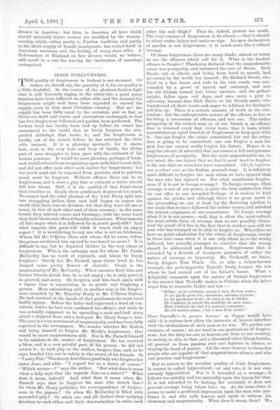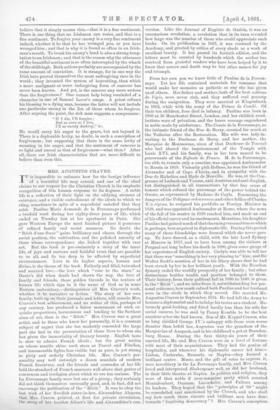IRISH FORGIVENESS.
THE quality of forgiveness in Ireland is not strained. Or rather, we should say, the quantity of it, for its quality is a little doubtful. In the course of the glorious faction-fight -that is still furiously raging in the sister-isle, a good many injuries have been inflicted on either side, and the demand for forgiveness might well have been expected to exceed the supply, even in that most Christian country. But no ! the :supply has been fully equal to the occasion, and as fast as 'blows are dealt and curses and execrations exchanged, so fast has free forgiveness followed and pardon been professed. The broken head has hardly been tied up before its owner has announced to the world that he freely forgives the mis- guided shillelagh that broke it; and the forgiveness is hardly out of his mouth before he has returned the blow with interest. It is a pleasing spectacle, for it shows how, even in the very heat and fury of battle, the divine part of man struggles to keep pace with the outburst of his human passions. It would be more pleasing, perhaps, if Irish- men would refrain from trespassing upon each other's coat-tails, and did not offer each other such matter for forgiveness ; but too much must not be expected from patriots, and to patriots much must be forgiven. Without offence there can be no forgiveness, and it were a pity that so eminent a virtue should -fall into disuse. Still, it is the quality of that forgiveness that troubles us. Really these gentlemen do protest too much. No sooner had the solid phalanx of the Irish Party split into two struggling halves, than each half began to assure the world that there was no division, but that they were all one at theart, in love of each other and of their country : in the same breath they uttered curses and blessings; with the same band they dealt blows and offered friendly salutations. What imports all this anger when it is followed by so, much good-will ? And what imports this good-will when it wears such an angry aspect ? It is bewildering to any one who is not an Irishman. Whom did Mr. O'Brien bless, and whom aid he curse, before -the prison swallowed him up and he was heard no more ? It is difficult to say, but he departed thither in the very odour of forgiveness. Who is the unhappy man for whom Mr. Justin McCarthy has no word of reproach, and whom he freely forgives ? Surely not Mr. Parnell, upon whose head he has heaped some pretty flowers of rhetoric. Great is the magnanimity of Mr. McCarthy. When enemies flout him, and former friends deride him, he is not angry ; he is only grieved, .so grieved, and sorry. He forgives, and hits back again with a vigour that is astonishing in. so gentle and forgiving a person. More astonishing still, in another way, is the forgive- ness extended by Mr. Timothy Healy to Mr. O'Brien Dalton.
had received at the hands of that gentleman the most cruel bodily injury. Before the latter had expressed a word of con- trition, before he had even confessed his offence, and while he was actually supposed to be spreading a cock-and-bull story .about a slippery floor and a bed-post, Mr. Healy forgave him. 'The case is a very monument of magnanimity, and has been fully treported in the newspapers. We wonder whether Mr. Dalton will bring himself to forgive Mr. Healy's forgiveness : that would be more magnanimous still. Nor is Mr. Parnell himself to be outdone in the matter of forgiveness. He too received a blow, and in a very painful part of his person : he did not return it ; he took pity on the striker, forgave him, and, as he says, handed him out in safety to the crowd of his friends. In -‘'Vanity Fair," Thackeray describes a good lady who forgives her sister Jane, and adds : "I regard her as a sister, of course."
Which means—?" says the author. " But what does it mean when a lady says that she regards Jane as a sister P" What does it mean, indeed? And what does it mean when Mr. Parnell says that he forgives the man who struck him ? Or when Mr. Healy publishes his correspondence of forgive- ness in the papers ? Or when Mr. McCarthy is filled with 'sorrowful pity? Or when one and all declare their undying devotion to each other, and their determination to smite each other hip and thigh ? They do, indeed, protest too much. The very essence of forgiveness is its silence ;—that it should be silent under injury and make no sign. An open declaration of pardon is not forgiveness ; it is much more like a refined revenge.
Of sham forgiveness there are many kinds; almost as many as are the offences which call for it. What is the hardest
offence to forgive ? Thackeray declared that the unpardonable crime was prosperity, and instanced the ease of Steele. Dick Steele, out at elbows and living from hand to mouth, had no enemy in the world but himself : Sir Richard Steele, who lived in a fine house and rode in his own coach, was sur- rounded by a growl of hatred and contempt, and saw his old friends turned into bitter enemies : and the gallant
knight, fallen upon evil days, and once more a prey to adversity, became dear Dick Steele to his friends again, who
transferred all their wrath and anger to Addison for daring to sell him up. There is a certain amount of truth in the con- tention; but the unforgiveable nature of the offence is due to its being a succession of offences, and not one. The undue prosperity of the wicked man, or of our friend, is an offence that is renewed every day, every hour, that it lasts, which necessitates an equal renewal of forgiveness to keep pace with it. One can forgive the crime committed, but not the crime that is going to be committed ; one can forgive a man his past, but one cannot really forgive his future. Hence it is only the advent of adversity that can ensure a full and genuine forgiveness of prosperity. But the most unpardonable sin, to our mind, the one injury that we find it most hard to forgive, is the one that we ourselves have committed. Chi fa ingiuria non perdona mai, as the Italian proverb runs. It is infinitely more difficult to forgive the man whom we have injured than the man who has injured us. For what constitutes forgive- ness, if it is not to forego revenge ? To forego revenge, when revenge is out of our power, is quite the best satisfaction that we can offer to our wounded feelings : it is useless to kick against the pricks, and although there is no great merit in the proceeding, we can at least lay the flattering unction to
our souls that we have followed the nobler course, and satisfied the utmost exigencies of our consciences. To forego revenge when it is in our power,—well, that is often the most refined, the most subtle form of revenge that we can possibly obtain. And the proof of it lies in the fact that in neither case will the man who has wronged us be able to forgive us. Wherefore we have no great admiration for the virtue of forgiveness, except in those rare cases when it is not only silent as to the wrong inflicted, but actually attempts to contrive that the wrong should be obliterated and forgotten. Forgiveness that is attended by a flourish of trumpets, partakes of either the nature of revenge or hypocrisy. Mr. Pecksniff, we know, freely forgave Tom Pinch. Or, to take a better-known example, the arch-hypocrite Tartuffe freely forgave the son whom he had turned out of his father's house. What a delightful comment upon the nature of blatant forgiveness is the answer that Tartuffe makes to Cl4ante when the latter urges him to reconcile father and son :—
"Htilas I je Is voudrais, quant a moi, de bon our; Se no garde pour lui, monsieur, aucune aigreur ; Jo lui pardonne tout de rien is ne is blame, Et voudrais Is servir du meilleur de mon ame ; Mais l'interat du del n'y saurait consentir, Et s'il rentre dans, c'est 1 moi d'en sortir."
Poor Tartuffe 1—le pauvre honvole ! as Orgon would have said—it is curious how often the interests of heaven interfere
with the inclinations of such men as he was. We pardon our enemies, of course ; we are loud in our professions of forgive- ness; but the duty we owe to heaven, our duty to our country, to society, to this, to that, and a thousand other things besides, all prevent us from passing over our injuries in silence, or staying the hand of justice. All the more honour to those few people who are capable of that magnanimous silence, and who can practise real forgiveness !
But to return to the peculiar quality of Irish forgiveness. It cannot be called hypocritical,—at any rate, it is not con- sciously hypocritical. Nor is it intended as a revenge ; it follows too quickly and too naturally upon the injury for that. It is not intended to be lasting, for certainly it does not prevent revenge being taken later on. At the same time, it seems to make a profound impression upon the man who pro- fesses it, and who calls heaven and earth to witness his clemency and magnanimity. What does it mean, then ? We believe that it simply means this,—that it is a fine sentiment. There is one thing that no Irishman can resist, and that is a fine sentiment. To forgive your enemy is a very fine sentiment indeed, whether it be that he has wronged you, or you have wronged him ; and that is why it is found so often in an Irish- man's mouth. To break his enemy's head, is also a strong temp- tation to an Irishman ; and that is the reason why the utterance of the beautiful sentiment is so often interrupted by the whack of the shillelagh. Both actions probably are accompanied by the same amount of conviction. It is strange, for in one way the Irish have proved themselves the most unforgiving race in the world ; they invented the system of boycotting, than which a more malignant or more unforgiving form of rancour has never been known. And yet, is the rancour any more serious than the forgiveness ? One cannot help being reminded of a character in one of Samuel Lover's songs. A priest refuses his blessing to a dying man, because the latter will not include one particular enemy in the list of those whom he forgives. After arguing the point, the sick man suggests a compromise : "If I die, forgive ; But as sure as I live, I'll as surely destroy," &c.
He would carry his anger to the grave, but not beyond it. There is a deplorable levity, no doubt, in such a conception of forgiveness ; but supposing that there is the same levity of meaning in his anger, and that the sentiment of rancour is as light and unreal as that of forgiveness—what then? After all, there are Irish characteristics that are more difficult to believe than even this.







































 Previous page
Previous page